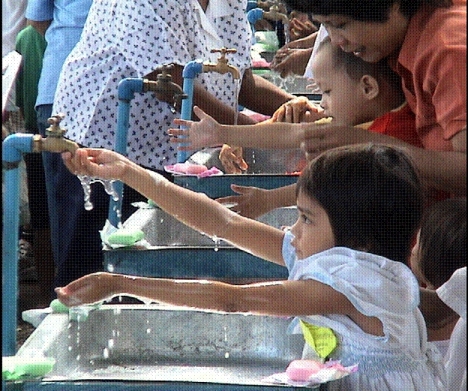| HOME | FAQS | SITE MAP | CONTACT US | |||
 |
|||
ECO-Asia Sustainable Water ServicesBACKGROUNDWidespread migration to urban centers throughout Asia is placing tremendous stress on urban water supplies and sanitation services, with a disproportionate impact on the poor and women. Improving access to clean water and adequate sanitation for the urban poor is among the highest priorities facing Asian decision-makers, who are committed to achieving the Millennium Development Goals (MDG) by halving by 2015 the proportion of people without sustainable access to safe drinking water and sanitation. Meeting MDG water targets will require new investment and significant increases in financial flows from a range of sources, including higher user tariffs, governmental outlays, local financial markets, multilateral financial institutions and bilateral donors. Devising innovative financing strategies, however, poses a significant challenge for many water and sanitation service providers in Asia. For most water and sanitation service providers, revenues do not cover recurring expenditures, and resulting financial shortfalls seriously limit their ability to improve or expand services, leading to a vicious cycle of service delivery decline. Sustainability is the central principle guiding USAID's Environmental Cooperation-Asia (ECO-Asia) water and sanitation activities. ECO-Asia works with partner organizations that are committed to demonstrating innovative solutions that link enhanced service delivery or policy reform with improved access to finance. In many cases, prospective investors and financial institutions will only invest in creditworthy or “bankable” service providers that are capable of recovering costs and meeting loan, bond or other investment obligations. For ECO-Asia, strengthening the credit capacity of service providers is a necessary first step in supporting new investments for improved or expanded service. Depending on local opportunities and constraints, ECO-Asia facilitates the transition to sustainable services by promoting cost-efficient and well-managed operations, cost-reflective tariffs, and feasible financing options for expanded services, especially targeting the urban poor. Through pilot projects and regional activities, ECO-Asia demonstrates and disseminates innovative policies and practices for expanding or improving water and sanitation services. Strategic focus areas for ECO-Asia water and sanitation program include:
APPROACHSharing best practices and experience is at the heart of ECO-Asia’s water and sanitation activities. Primary implementation strategies include:
ECO-Asia deploys a range of program resources including targeted technical assistance, coordination support, small grants, exchanges, and communications support. In collaboration with program partners, ECO-Asia applies these resources in an integrated mix to support policy formulation workshops, targeted studies, awareness campaigns, peer-to-peer exchanges, counterpart twinning arrangements, regional toolkits, regional forums and trainings, and communications tools. Pilot Projects The overall approach combines targeted support for pilot activities in individual cities with national policy development and regional dissemination of best practices. To promote regional cooperation, ECO-Asia facilitates counterpart exchange for country and regional activities, including facilitating peer-to-peer “twinning” arrangements between Asian or U.S. counterparts. Regional Cooperation IMPLEMENTING PARTNERSPADCO, The Asia Foundation, U.S. Environmental Protection Agency, Southeast Asian Water Utilities Network (SEAWUN), The Communities Group International CONTACTJohn R. Pasch FURTHER READING
| |||
|
|||
